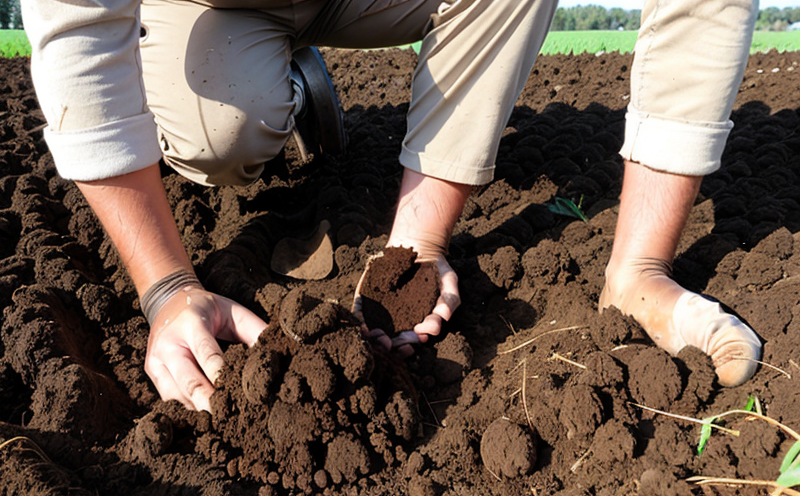Soil Nutrient Retention Testing
The importance of soil nutrient retention cannot be overstated in agriculture and forestry. Soil quality directly influences crop productivity, environmental sustainability, and economic viability. Accurate testing to assess the retention capacity of soil nutrients is crucial for optimizing fertilization practices, enhancing crop yield, and ensuring long-term ecological balance. This service focuses on evaluating the ability of soils to retain essential plant nutrients, which are critical for healthy plant growth.
Soil nutrient retention refers to the soil's capacity to hold onto macronutrients such as nitrogen (N), phosphorus (P), potassium (K), calcium (Ca), magnesium (Mg), and micronutrients like iron (Fe), zinc (Zn), manganese (Mn), copper (Cu), molybdenum (Mo), and boron (B). These nutrients are essential for plant growth, and their efficient retention in soil helps prevent leaching and runoff into water bodies, thus minimizing environmental pollution.
The testing process involves several critical steps. Initially, a representative sample of the soil is collected from various depths to ensure that it reflects the overall nutrient availability within the tested plot or field. The sample is then prepared for analysis by sieving and drying to remove any foreign materials such as stones and plant debris. This preparation ensures accurate nutrient quantification.
Once prepared, the soil is subjected to a series of laboratory tests designed to measure its retention capacity. These tests include cation exchange capacity (CEC) measurements, which quantify the soil's ability to hold onto positively charged ions like potassium and calcium. Additionally, methods such as ammonium nitrate leaching and sodium bicarbonate extractions are employed to assess nutrient loss due to water movement through the soil profile.
The results of these tests provide insights into the soil's capacity to retain nutrients under different conditions. Factors such as soil pH, organic matter content, cation exchange capacity (CEC), and texture play a significant role in determining how well soils can retain nutrients. Understanding these factors helps in making informed decisions regarding fertilization strategies, which is essential for sustainable agricultural practices.
By identifying nutrient hotspots or deficiencies within the soil profile, this testing service aids in optimizing fertilizer application rates, reducing unnecessary environmental stress on ecosystems. Furthermore, it supports precision agriculture initiatives aimed at minimizing resource wastage while maximizing crop output.
The information derived from these tests is invaluable for quality managers and R&D engineers working in agribusinesses and forestry operations. They can leverage this data to develop more efficient nutrient management plans that enhance productivity without compromising soil health or environmental integrity.
| Applied Standards | Description |
|---|---|
| ISO 17295:2013 | Determination of cation exchange capacity (CEC) |
| ASTM D864-18 | Standard test methods for determining available soil phosphorus by ammonium nitrate extraction |
Why Choose This Test
Selecting this service ensures comprehensive understanding of your soil's nutrient retention capabilities, enabling you to make data-driven decisions that optimize crop productivity and protect the environment. By investing in our Soil Nutrient Retention Testing, you gain access to precise analytical results backed by internationally recognized standards.
Our testing methodology adheres strictly to established protocols ensuring reliability and accuracy. This adherence is crucial for meeting regulatory requirements and achieving consistent quality outcomes across diverse agricultural landscapes. Whether you're a farmer seeking improved yields or an environmental consultant aiming to mitigate pollution, our service offers tailored solutions that align with your specific needs.
The benefits extend beyond mere compliance; they encompass enhanced decision-making capabilities grounded in empirical evidence. Our team of experts provides personalized consultations aimed at helping stakeholders understand the implications of their soil test results. From identifying optimal fertilization schedules to recommending sustainable management practices, we ensure every step aligns with long-term goals set by our clients.
Moreover, choosing this service demonstrates commitment towards responsible resource utilization and sustainable agricultural practices. It underscores a proactive approach aimed at preserving natural resources while fostering economic growth within the industry. By partnering with us, you contribute to building resilient ecosystems that support future generations.
Use Cases and Application Examples
This testing service finds application in various scenarios where accurate assessment of soil nutrient retention is paramount. For instance, it plays a key role during site-specific agricultural planning by providing detailed insights into local soil conditions. This information allows farmers to tailor their farming practices effectively across different regions.
In environmental restoration projects, understanding how well the restored soils can retain nutrients aids in predicting the success rates of reforestation initiatives or grassland rehabilitation efforts. It helps determine whether newly planted trees or grasses will thrive without additional inputs over time.
For research institutions engaged in developing new crop varieties or exploring innovative farming methods, our service offers invaluable data points that contribute to ongoing studies on plant nutrition and soil health dynamics. This knowledge base supports advancements in biotechnology and agronomy fields.
| Use Cases | Description |
|---|---|
| Agricultural Planning | Identifying best practices for resource allocation based on local soil characteristics. |
| Environmental Restoration | Predicting the success of reforestation efforts by evaluating soil retention capacity. |
| Crop Variety Development | Gathering data to enhance understanding of plant nutrition and soil health dynamics. |
In summary, this testing service equips stakeholders with critical knowledge needed for making informed decisions related to soil management. Whether you're involved in large-scale agricultural operations or smallholder farming initiatives, our expertise ensures that every aspect receives meticulous attention.





